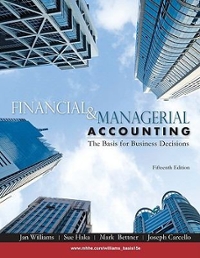Question
In regards to the alleged Harvard scanadal in May 2012 where 125 undergraduates were alleged to have cheated on an exam. Harvard released the results
In regards to the alleged Harvard scanadal in May 2012 where 125 undergraduates were alleged to have cheated on an exam. Harvard released the results of its investigation into the controversy, in which 125 undergraduates were alleged to have cheated on an exam in May 2012.1The university said that more than half of the students were forced to withdraw, a penalty that typically lasts from two to four semesters. Many returned by 2015. Of the remaining cases, about half were put on disciplinary probationa strong warning that becomes part of a student's official record. The rest of the students avoided punishment.
In previous years, students thought of Government 1310 as an easy class with optional attendance and frequent collaboration. But students who took it in spring 2012 said that it had suddenly become quite difficult, with tests that were hard to comprehend, so they sought help from the graduate teaching assistants who ran the class discussion groups, graded assignments, and advised them on interpreting exam questions.
Administrators said that on final-exam questions, some students supplied identical answers (right down to typographical errors in some cases), indicating that they had written them together or plagiarized them. But some students claimed that the similarities in their answers were due to sharing notes or sitting in on sessions with the same teaching assistants. The instructions on the take-home exam explicitly prohibited collaboration, but many students said they did not think that included talking with teaching assistants.
The first page of the exam contained these instructions: "The exam is completely open book, open note, open Internet, etc. However, in all other regards, this should fall under similar guidelines that apply to in-class exams. More specifically, students may not discuss the exam with othersthis includes resident tutors, writing centers, etc."
Students complained about confusing questions on the final exam. Due to "some good questions" from students, the instructor clarified three exam questions by e-mail before the due date of the exams.
Students claim to have believed that collaboration was allowed in the course. The course's instructor and the teaching assistants sometimes encouraged collaboration, in fact. The teaching assistantsgraduate students who graded the exams and ran weekly discussion sessionsvaried widely in how they prepared students for the exams, so it was common for students in different sections to share lecture notes and reading materials. During the final exam, some teaching assistants even worked with students to define unfamiliar terms and help them figure out exactly what certain test questions were asking.
Some have questioned whether it is the test's design, rather than the students' conduct, that should be criticized. Others place the blame on the teaching assistants who opened the door to collaboration outside of class by their own behavior in helping students to understand the questions better.
My question is do you think Harvard had a right to search the e-mail accounts of junior faculty, looking for the source of leaks to the news media because of a cheating? Explain.
Thank you,
Gema
Step by Step Solution
There are 3 Steps involved in it
Step: 1

Get Instant Access to Expert-Tailored Solutions
See step-by-step solutions with expert insights and AI powered tools for academic success
Step: 2

Step: 3

Ace Your Homework with AI
Get the answers you need in no time with our AI-driven, step-by-step assistance
Get Started


